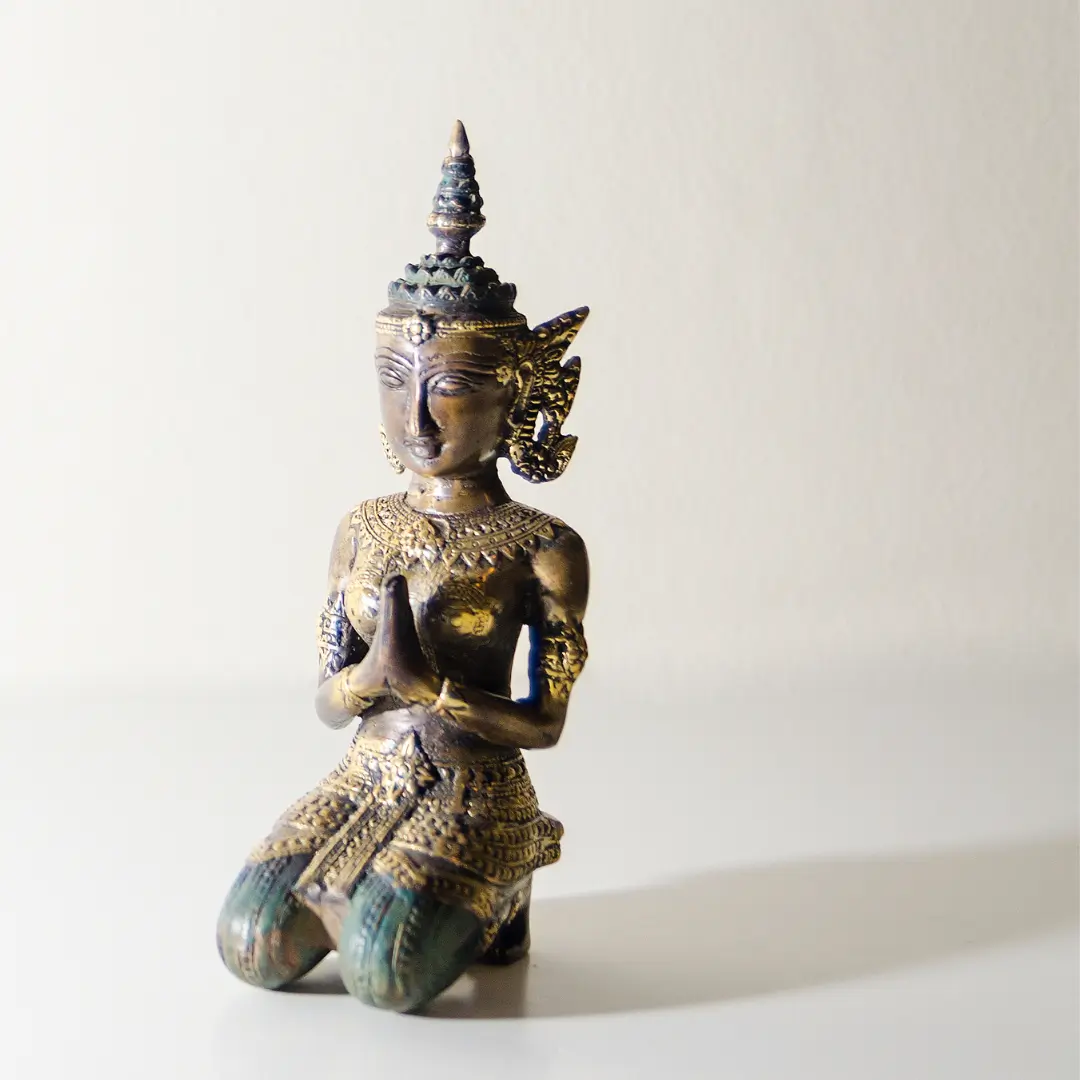The practice of mindfulness has become increasingly popular in recent years, as people strive to live more balanced and meaningful lives. Zen mindfulness practices are an effective way to bring balance and clarity into one’s daily life. Through the practice of meditation, awareness of the present moment, and mindful living, individuals can begin to experience a greater sense of peace, purpose and joy. By integrating these Zen mindfulness practices into our daily lives we can begin to cultivate a deep inner connection that leads to true transformation.
Introduction
Do you ever feel like your mind is constantly racing and you just can’t seem to focus on the present moment? If so, you’re not alone. In today’s fast-paced world, it’s easy to get caught up in the hustle and bustle of everyday life and forget to take a moment to simply breathe and be present.
This is where Zen mindfulness practices come in. In this blog post, we’ll explore what Zen mindfulness practices are and why they’re so important for daily life. We’ll delve into the key principles of Zen mindfulness, including mindful breathing, walking, eating, and communication, and provide you with practical tips for incorporating mindfulness into your daily routine.
So, whether you’re new to mindfulness or an experienced practitioner, this post is for you. Let’s get started by defining what Zen mindfulness practices are and exploring why they’re so crucial for a happy, healthy, and fulfilling life.
What are the Zen mindfulness practices?
Zen mindfulness practices are a set of techniques and exercises that are designed to cultivate awareness and presence in the present moment. Derived from Zen Buddhism, these practices aim to help individuals develop a deep and profound sense of inner peace and calmness by training their minds to be more attentive, focused, and non-judgmental.
At the core of Zen mindfulness practices is the concept of “zazen,” which refers to sitting meditation. During zazen, practitioners sit in a comfortable and stable position, focus their attention on their breath, and observe their thoughts and emotions without judgment or attachment.
In addition to zazen, Zen mindfulness practices also include other techniques such as mindful breathing, walking, eating, and communication. By incorporating these practices into your daily routine, you can learn to stay present and centered even in the midst of stressful or challenging situations, leading to a greater sense of well-being and inner harmony.
Why Zen mindfulness practices are important for Daily Life
Zen mindfulness practices are essential for daily life because they can help individuals develop a deeper awareness of their thoughts, emotions, and physical sensations. Through regular practice, one can learn to observe their experiences without judgment, cultivate a sense of calm and tranquility, and increase their capacity for concentration and focus.
In our modern, fast-paced world, it is easy to become overwhelmed and stressed by the constant demands of work, family, and other obligations. Zen mindfulness practices can provide a much-needed respite from the chaos of daily life, allowing individuals to slow down, reflect, and connect with their inner selves.
Moreover, Zen mindfulness practices have been shown to have numerous health benefits, including reducing anxiety and depression, improving sleep quality, and even boosting the immune system. By taking a few minutes each day to practice mindfulness, individuals can enhance their overall well-being and increase their ability to handle the challenges that come their way.
Overall, Zen mindfulness practices are an excellent tool for anyone looking to cultivate greater awareness, presence, and peace in their daily lives. Whether you are seeking to reduce stress, improve your mental health, or simply live a more fulfilling and satisfying life, the benefits of mindfulness are clear and well-documented.
Zen State of Mind in Buddhism
In today’s fast-paced world, it’s easy to get caught up in the hustle and bustle of daily life. With constant demands from work, family, and social media, it can be challenging to find a moment of peace and tranquillity. This is where mindfulness comes in. Mindfulness is the practice of being present in the moment, fully engaged with your thoughts, emotions, and surroundings. It’s a powerful tool that can help you cultivate a sense of calm and awareness, even amidst the chaos of daily life.
One of the most well-known traditions of mindfulness is found in Zen Buddhism, a practice that originated in China and spread throughout Japan, Korea, and other parts of Asia. Zen Buddhism emphasizes the importance of mindfulness in daily life, teaching practitioners to focus on the present moment and cultivate a deep sense of awareness.
We’ll explore the history of Zen Buddhism and its emphasis on mindfulness. We’ll also dive into the key principles of Zen mindfulness practices, including the role of meditation, self-reflection, and awareness. By the end of this post, you’ll have a deeper understanding of the transformative power of mindfulness and how it can help you find peace and clarity in your daily life.
History of Zen Buddhism
Before we dive into the world of Zen Buddhism and mindfulness practices, let’s take a moment to explore the rich history behind this ancient tradition. Zen Buddhism has its roots in China, where it emerged as a form of Mahayana Buddhism during the Tang Dynasty (618-907 CE). The practice then spread to Japan, Korea, and other parts of Asia, where it continues to be a vibrant and influential spiritual tradition to this day.
At its core, Zen Buddhism is a practice that emphasizes the importance of direct experience and personal insight. Rather than relying on dogma or scripture, Zen practitioners seek to awaken their own inherent wisdom through meditation, self-reflection, and mindfulness practices. This approach has given rise to a unique and deeply transformative form of Buddhism that is renowned for its simplicity, directness, and practicality.
Zen Buddhism has faced numerous challenges and undergone significant transformations throughout its long and storied history. From the early days of Chinese Chan Buddhism to the emergence of Japanese Zen, this tradition has adapted and evolved to meet the needs of each generation of practitioners. Today, Zen Buddhism remains a vital and dynamic tradition that continues to inspire people around the world to seek greater understanding, insight, and awareness.
The Role of Mindfulness for Zen State of Mind
Mindfulness is an essential component of Zen practice, and it plays a crucial role in cultivating a deeper understanding of the self and the world around us. At its core, mindfulness is about being fully present in the moment, observing your thoughts, emotions, and physical sensations without judgment. In Zen practice, this is achieved through a variety of techniques, including meditation, breathing exercises, and self-reflection.
The role of mindfulness in Zen practice is multi-faceted. On one hand, it allows us to become more aware of our thoughts and emotions, helping us to develop a greater sense of clarity and insight. By observing our thoughts and emotions without getting caught up in them, we can gain a deeper understanding of our habitual patterns and tendencies, which can help us to break free from limiting beliefs and behaviors.
At the same time, mindfulness in Zen practice can also help us to cultivate a sense of compassion and connection with others. By becoming more attuned to our own thoughts and emotions, we can better understand and empathize with the experiences of those around us. This can help us to cultivate deeper relationships, foster a greater sense of community, and contribute to a more peaceful and harmonious world.
Overall, the role of mindfulness in Zen practice is to help us become more present, more aware, and more compassionate. By incorporating mindfulness into our daily lives, we can cultivate a deeper sense of peace and understanding, both within ourselves and in relation to the world around us.
Principles of Zen mindfulness practices
When it comes to Zen mindfulness practices, there are a few key principles that form the foundation of this transformative practice. At their core, these principles emphasize the importance of being present in the moment, cultivating awareness and self-reflection, and approaching life with a sense of openness and curiosity.
One of the most important principles of Zen mindfulness is the practice of meditation. Through regular meditation, practitioners can learn to quiet the mind and cultivate a deep sense of inner calm and tranquility. This can help to reduce stress and anxiety, increase focus and concentration, and promote overall well-being.
Another key principle of Zen mindfulness is the practice of self-reflection. By taking the time to reflect on one’s thoughts, emotions, and experiences, practitioners can gain a deeper understanding of themselves and the world around them. This can help to cultivate a greater sense of compassion and empathy, as well as a more profound appreciation for the beauty and complexity of life.
Finally, Zen mindfulness emphasizes the importance of approaching life with a sense of openness and curiosity. By remaining open to new experiences and perspectives, practitioners can cultivate a sense of wonder and joy in their daily lives. This can help to counteract feelings of boredom or stagnation and keep the mind engaged and inspired.
Overall, these key principles of Zen mindfulness practices can help individuals cultivate a greater sense of awareness, presence, and peace in their daily lives. By embracing these principles and incorporating them into their daily routine, practitioners can unlock the transformative power of mindfulness and live a more fulfilling and satisfying life.
Zen Mindfulness Practices for Daily Life
Zen mindfulness is a powerful tool for cultivating a deep sense of presence and awareness at the moment, allowing you to better handle the challenges of daily life with greater calm and clarity. Now, we’ll be delving into the key practices of Zen mindfulness, exploring how you can incorporate these practices into your daily routine to enhance your overall well-being.
Mindful Breathing
Mindful breathing is a simple yet powerful technique that can help you cultivate a sense of calm and awareness in your daily life. By focusing your attention on your breath and observing your thoughts and emotions without judgment, you can learn to respond to stress and anxiety in a more mindful way.
If you’re new to mindful breathing, don’t worry – it’s easy to get started. Here’s a step-by-step guide to help you practice mindful breathing:
Step 1: Find a quiet place where you won’t be disturbed. Sit comfortably in a chair or on a cushion with your back straight but not rigid.
Step 2: Close your eyes or soften your gaze and begin to focus your attention on your breath. Notice the sensation of air flowing in and out of your nose or mouth.
Step 3: If your mind begins to wander, gently bring your attention back to your breath without judgment. It’s natural for your mind to wander, so don’t be hard on yourself if it happens.
Step 4: As you continue to focus on your breath, begin to observe your thoughts and emotions without getting caught up in them. Simply notice them as they arise and let them go.
Step 5: Practice for a few minutes at a time, gradually increasing the length of your sessions as you become more comfortable with the practice.
By following these simple steps, you can begin to experience the benefits of mindful breathing in your daily life. Whether you’re dealing with stress at work, tension in your relationships, or simply looking to cultivate a greater sense of calm and awareness, mindful breathing can help you find the peace and clarity you’re seeking.
Benefits of mindful breathing
Here are some of the benefits of Mindful breathing:
- Reduces stress and anxiety
- Activates the parasympathetic nervous system, responsible for the “rest and digest” response
- Counters the effects of the sympathetic nervous system, responsible for the “fight or flight” response
- Improves concentration and focus
- Trains the mind to stay present at the moment
- Helps to let go of distracting thoughts
- Can be done anywhere, anytime
- A simple and effective form of meditation
- Has both physical and mental health benefits
Mindful Walking
Mindful walking is a simple but powerful practice that can help you connect with the present moment and cultivate a sense of inner peace and calm. Unlike traditional walking, which is often done on autopilot, mindful walking requires you to be fully present and aware of your surroundings.
If you’re new to mindful walking, don’t worry! In this post, we’ll provide step-by-step instructions to help you get started. First, find a quiet and peaceful place to walk, free from distractions and noise. Begin by standing still and taking a few deep breaths, focusing your attention on your breath as you inhale and exhale.
Next, begin to walk slowly and mindfully, paying close attention to each step you take. Notice the feeling of your feet touching the ground, the movement of your legs and hips, and the rhythm of your breath. If your mind starts to wander, gently bring your attention back to the present moment and the sensation of walking.
As you continue to walk mindfully, you may find that your thoughts and emotions begin to settle, and you feel a greater sense of calm and clarity. You may also notice new details in your surroundings that you had never noticed before, such as the colors of the trees or the sounds of the birds.
Remember, mindful walking is not about reaching a particular destination or goal. Instead, it’s about being fully present and aware of the experience of walking itself. So take your time, savor each step, and enjoy the peace and tranquillity that comes with this simple but powerful practice.
Incorporating mindful walking into your daily routine can have a profound impact on your mental and physical well-being. With these step-by-step instructions, you’ll be on your way to a more mindful and peaceful life in no time.
Benefits of mindful walking
Here are some of the benefits of mindful walking:
- Mindful walking can reduce stress levels by calming the mind and body.
- Regular mindful walking can boost the immune system and reduce the risk of illness.
- Practicing mindfulness during walks can improve focus and concentration.
- Mindful walking can increase physical activity levels and promote overall fitness.
- Walking in nature can have a soothing effect on the mind and body.
- Mindful walking can improve mood and overall mental well-being.
- It can help lower blood pressure and improve cardiovascular health.
- Mindful walking is an easy and accessible form of exercise that can be done anywhere.
- Incorporating mindful walking into a daily routine can lead to better sleep and increased energy levels.
- Mindful walking can be a great way to connect with nature and appreciate the beauty around us.
Mindful Eating
Mindful eating is a practice that encourages us to slow down and savor every bite, paying attention to the flavors, textures, and sensations of our food. By practicing mindful eating, we can cultivate a deeper sense of gratitude for the nourishment our food provides and a greater awareness of our body’s hunger and fullness signals.
If you’re new to mindful eating, it can be helpful to have some step-by-step instructions to guide you through the process. Here are some simple steps you can take to practice mindful eating:
Set aside time for your meal
Before you start eating, take a few minutes to prepare your meal and set aside a dedicated space for eating. Turn off your phone and eliminate any distractions that might take your attention away from your food.
Take a few deep breaths
Before taking your first bite, take a few deep breaths and bring your attention to the present moment. Notice any sensations in your body and become aware of any thoughts or emotions that may be present.
Engage your senses
As you take your first bite, pay attention to the flavors, textures, and aromas of your food. Notice the colors and shapes of your food and savor each bite.
Chew slowly and mindfully
Take the time to chew your food slowly and mindfully, savoring each bite and noticing the sensation of the food in your mouth. This can help you become more aware of when you are starting to feel full.
Listen to your body
As you eat, pay attention to your body’s hunger and fullness signals. Notice when you are starting to feel full and stop eating when you are satisfied, even if there is still food on your plate.
By following these simple steps, you can begin to incorporate mindful eating into your daily routine and enjoy a deeper connection with your food and your body. With practice, mindful eating can become a natural and enjoyable part of your everyday life.
Benefits of mindful eating
The benefits of mindful eating are as follows:
- Manage your weight with mindful eating.
- Improve digestion through mindful eating habits.
- Enjoy your meals and increase satisfaction with mindful eating.
- Reduce stress and improve mental clarity with mindful eating.
- Develop healthy habits and a positive relationship with food through mindful eating.
Mindful Communication
Mindful communication is the practice of communicating in a way that is intentional, attentive, and empathetic. It involves being fully present at the moment, listening with curiosity and compassion, and speaking from a place of authenticity and clarity. Here are some step-by-step instructions for practicing mindful communication:
Start by setting an intention: Before you begin a conversation, take a moment to set an intention for the interaction. This could be something like, “I want to listen with an open mind” or “I want to speak from a place of kindness and understanding.”
Practice active listening: When someone is speaking, focus on what they’re saying instead of planning your response. Repeat back what you’ve heard to ensure you’ve understood correctly, and ask questions to clarify anything you’re unsure about.
Be aware of your body language: Nonverbal cues like eye contact, facial expressions, and posture can communicate as much as words. Make an effort to be present and engaged in the conversation, and avoid crossing your arms or looking away.
Stay present at the moment: Avoid getting caught up in your own thoughts or judgments during the conversation. Instead, focus on the present moment and what the other person is saying.
Avoid blame or defensiveness: If the conversation becomes difficult, try to avoid blaming or becoming defensive. Instead, focus on finding common ground and working towards a solution together.
Take a break if needed: If the conversation becomes overwhelming, it’s okay to take a break and come back to it later. Sometimes a little space can help you approach the situation with a fresh perspective.
Practice gratitude: After the conversation, take a moment to reflect on what you’ve learned or gained from the interaction. Even if the conversation was challenging, there’s often something positive to take away from it.
Benefits of mindful communication
Some of the benefits of mindful communication are:
- Mindful communication fosters understanding and empathy in relationships.
- Through mindful communication, conflicts can be resolved effectively.
- Practicing mindful communication reduces stress and anxiety.
- Mindful communication enhances self-awareness and promotes personal growth.
- Active listening and clear communication are the hallmarks of mindful communication.
- Mindful communication leads to better decision-making and problem-solving.
- Productivity and collaboration are increased through mindful communication.
- Mindful communication strengthens mental health and well-being.
- Empathy and connection are fostered through mindful communication.
- Mindful communication creates a space for respectful and open dialogue.
Incorporating Zen Mindfulness Practices into Your Daily Routine
Incorporating Zen mindfulness practices into your daily routine can help you live a more peaceful and fulfilling life. By taking just a few minutes each day to practice mindfulness, you can cultivate a sense of calm and clarity that will benefit you in all areas of your life.
Here are some tips for incorporating Zen mindfulness practices into your daily routine:
- Start with simple practices: If you’re new to mindfulness, it’s best to start with simple practices like mindful breathing or body scan meditation. You can do these practices anywhere and they don’t require any special equipment or training.
- Set aside time each day: To make mindfulness a habit, it’s important to practice each day. You can start with as little as 5-10 minutes, and gradually increase the practice as you become more comfortable with it.
- Practice mindfulness during everyday activities: You don’t have to set aside specific time for mindfulness practice. Instead, try incorporating mindfulness into your daily activities, such as mindful walking or mindful eating.
- Use guided meditations: If you’re having trouble staying focused during mindfulness practice, try using guided meditations. There are many apps and websites that offer free guided meditation for mindfulness.
- Practice self-compassion: Remember that mindfulness is a practice, and it’s normal to have thoughts or distractions during practice, instead of allowing yourself to become frustrated, practice self-compassion and refocus your attention on your breath or body.
How to overcome common obstacles to mindfulness practice
Mindfulness practice can be a powerful tool for reducing stress, improving focus, and promoting emotional well-being. However, many people struggle to maintain a regular mindfulness practice due to common obstacles such as lack of time, difficulty focusing or feeling discouraged by a perceived lack of progress. If you’re struggling to incorporate mindfulness into your daily routine, here are some tips to help you overcome common obstacles:
Lack of time
If you feel like you don’t have enough time for mindfulness practice, try to start small. Even just a few minutes of mindfulness practice each day can be beneficial. Consider setting aside time in the morning or evening for a short mindfulness meditation or incorporating mindfulness into everyday activities such as walking or eating.
Difficulty focusing
If you find it challenging to stay focused during mindfulness practice, try incorporating guided meditations or mindfulness apps. These tools can help keep your attention on the present moment and provide a structure for your practice.
Perceived lack of progress
It’s common to feel like you’re not making progress in your mindfulness practice, but it’s important to remember that progress can be slow and subtle. Try to let go of any expectations or judgments about your practice and focus on the process of simply being present in the moment.
Resistance to discomfort
Mindfulness practice can sometimes bring up uncomfortable emotions or physical sensations. If you find yourself resisting these experiences, try to approach them with curiosity and compassion rather than judgment or avoidance. Remember that discomfort is a natural part of the human experience and can offer opportunities for growth and learning.
By incorporating these tips into your mindfulness practice, you can overcome common obstacles and experience the many benefits of mindfulness in your daily life. Remember to be patient and compassionate with yourself as you work to cultivate a regular practice.
Conclusion
In today’s fast-paced world, it’s easy to get caught up in the hustle and bustle of daily life. Stress, anxiety, and burnout can take a toll on our mental and physical health. However, incorporating Zen mindfulness practices into our daily routine can help us cultivate a more fulfilling and peaceful life.
Practicing mindfulness involves paying attention to the present moment and being fully engaged in what we’re doing without judgment. Zen mindfulness takes this practice to another level by emphasizing the importance of being present and fully engaged in every aspect of our lives, whether it’s eating, working, or spending time with loved ones.
By embracing Zen mindfulness practices, we can learn to let go of distractions and live in the moment. We can develop a greater sense of self-awareness and become more attuned to our thoughts and emotions. As a result, we can better manage stress, improve our relationships, and enhance our overall well-being.
In conclusion, embracing Zen mindfulness practices can be a powerful tool for living a more fulfilling and peaceful life. By making a conscious effort to be present and engaged in every aspect of our lives, we can cultivate greater self-awareness, improve our relationships, and manage stress more effectively. Incorporating mindfulness into our daily routine takes practice and dedication, but the benefits are well worth the effort.












